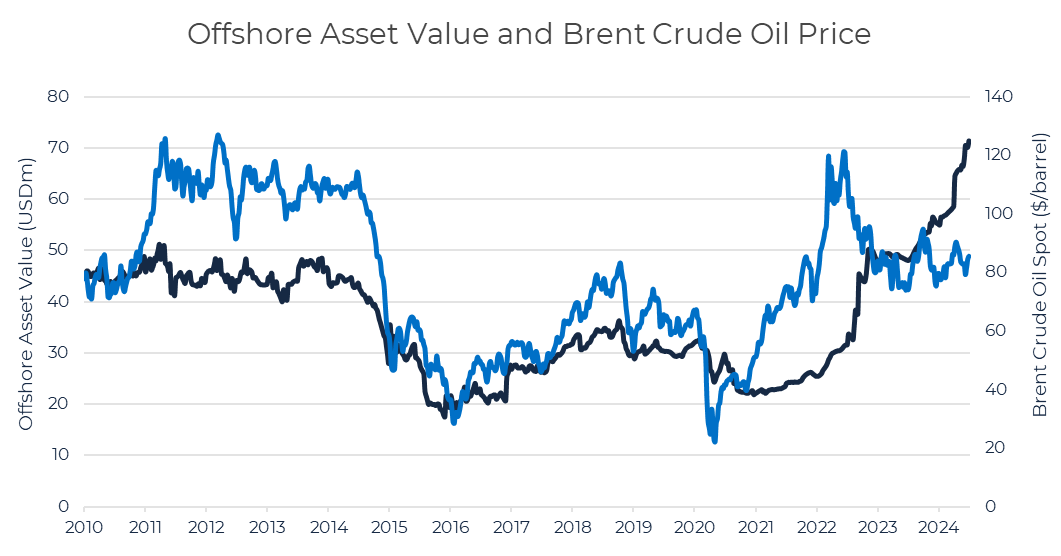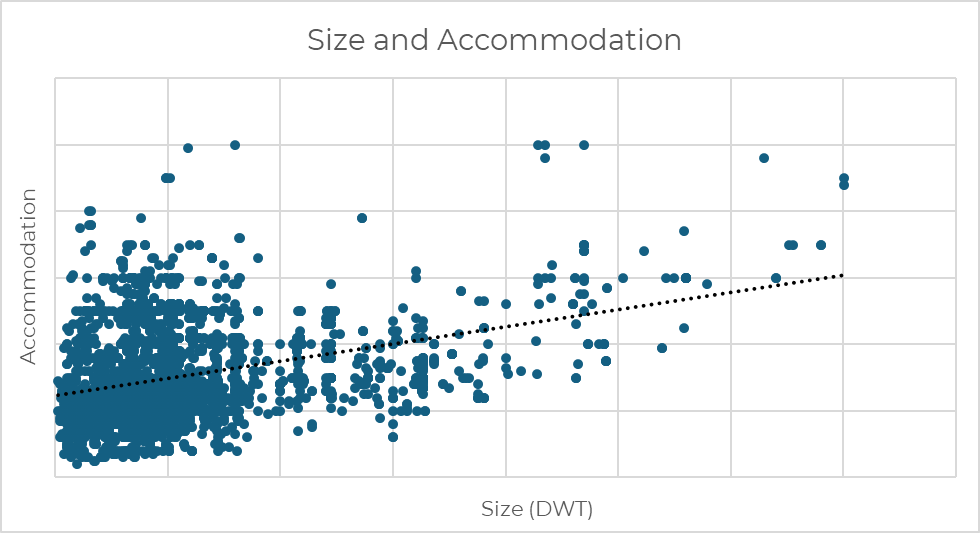MODU Valuation Variables
Introduction
The VesselsValue valuation methodology for the Offshore sector incorporates the 5-factor algorithm (Size, Age, Type, Features and Sentiment) described in our Mathematics of Market Valuation methodology and enables market valuations of vessels to be calculated in even the most illiquid markets. The following document outlines the specific features that are taken into consideration when valuing MODUs, allowing for accurate and unbiased values to be calculated.
Ship Type
MODUs are split into three types – Jack Up, Semi-Submersible and Drillship.
Size
Measured in Rated Water Depth (ft), Jack Ups range up to 500 ft Rated Water Depth, while Semisubmersibles and Drillships are as deep as 12,000 ft Rated Water Depth. Premiums and discounts for large/small vessels are calculated daily by the VV algorithms.
Age
Premiums and discounts for vessel age (i.e. depreciation) are calculated daily by the VV algorithms.
State of the Market (Earning Sentiment)
The best proxy for Offshore earnings sentiment is an index derived from a long and short term rolling average of the Brent Crude price. The oil price is the prime driver for the Offshore market, and effects vessel utilization, charter rates and market values. The correlation has been tested historically. Fig. 1 illustrates the relationship between the Brent Crude price and Offshore asset values.

Graph to represent the Offshore Asset Value (USDm) and Brent Crude Oil Prices ($ per barrel)
Features
Builder
Builder is a very significant variable to value. Please note that builder premiums and discounts for MODUs can be different to offshore and cargo vessels. These premiums are derived from the newbuilding and second hand markets.
Accommodation
Premiums and discounts are derived from a ratio between vessel size and total accommodation.
The black dotted line Fig.2 represents the expected amount of accommodation for that size, and either side of the line shows the premium/discount for more or less size/accommodation ratio. This has been performed separately for all MODU types.
The premium/discounts are based on the max/min accommodation a MODU can have at its position within the size range of the fleet. For example, two near identical Semisubmersibles, can be differentiated by the amount of accommodation they have and this will be represented in the accommodation premium they receive.

Graph to represent the correlation between size (DWT) and accommodation
Jones act
Does not apply to MODUs in relation to value.
Dynamic positioning
Premium based on what DP class it is. DP 0/1/2/3 represents how many back up computer systems are on board should one fail. DP3 is standard, discount for inferior capacity.
Drilling depth
Premium based on maximum drilling depth (ft).
Handling
Gearing/Heavy lifting Ability to handle BOPs, Xmas tree, Riser, Casing, Heavy gear that is dangerous and timely. Premium is proportional to capacity.
Twin derrick capable
Rigs receive an uplift due to increased efficiency, if fully equipped and functional.
Winterization/harsh & ultra harsh
MODUs of qualifying spec are given a premium based on design.
Design
Premiums based on design specifics and intended operational region(s) for the MODU design.
Bop (blow-out preventer)
Score based on capacity. 15,000 PSI BOP is the standard in this sector, so anything less receives a discount. Dual BOP, 6-7 ram BOP, API STD53 are the differentiating factors.
Mud pump PSI
7,500psi pumps increase MODU efficiency and depth range due to more foot drilled per hour (rate of penetration), shorter well completion times, reduced wear on pump as can use lower than maximum pressure, and more fluid velocity to keep borehole clean. Therefore, mud pump capacity below 7,500 PSI receives a discount.
Solids control system
More horsepower (2,200 HP) of mud pumps to drive increased PSI means more fluid volume coming over the shakers. This is included in the above mud pump premium.
